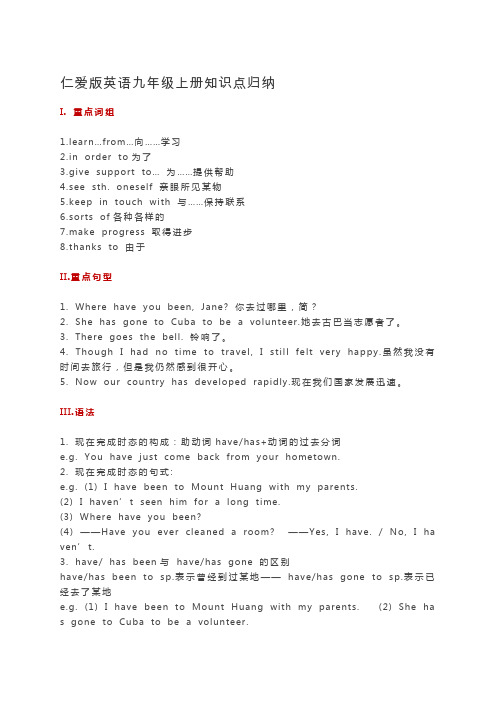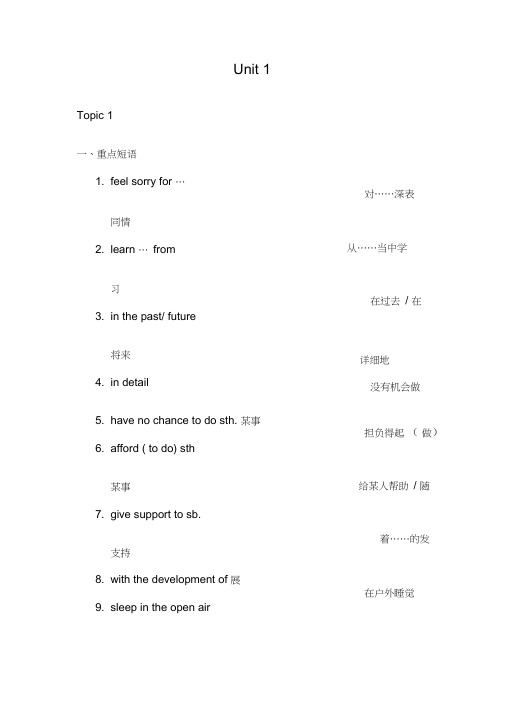仁爱英语新九年级上复习资料
仁爱版英语九年级上册知识点(优选6篇)

仁爱版英语九年级上册知识点(优选6篇)仁爱版英语九年级上册知识点(1)重点词组…from…向……学习order to为了support to…为……提供帮助oneself 亲眼所见某物in touch with 与……保持联系of各种各样的progress 取得进步to 由于重点句型Where have you been, Jane? 你去过哪里,简?She has gone to Cuba to be a 她去古巴当志愿者了。
There goes the 铃响了。
Though I had no time to travel, I still felt very 虽然我没有时间去旅行,但是我仍然感到很开心。
Now our country has developed 现在我们国家发展迅速。
语法现在完成时态的构成:助动词have/has+动词的过去分词You have just come back from your现在完成时态的句式:(1) I have been to Mount Huang with my(2) I haven’t seen him for a long(3) Where have you been?(4) ——Have you ever cleaned a room? ——Yes, I / No, I haven’have/ has been与 have/has gone 的区别have/has been to 表示曾经到过某地—— have/has gone to 表示已经去了某地(1) I have been to Mount Huang with my (2) She has gone to Cuba to bea仁爱版英语九年级上册知识点(2)重点词组not only…but also…不仅……而且……be supposed to 应该ought to 应该turn off 关掉instead of 代替on time 准时make sure 确保push forward向前推push down 向下up 向上拉重点句型For example, we should use both sides of paper and reuse plastic 例如,我们应该用纸的两面,并且重新使用塑料袋。
仁爱版英语新九年级上册知识点归纳

仁爱版英语九年级上册知识点归纳I. 重点词组1.learn…from…向……学习2.in order to为了3.give support to… 为……提供帮助4.see sth. oneself 亲眼所见某物5.keep in touch with 与……保持联系6.sorts of各种各样的7.make progress 取得进步8.thanks to 由于II.重点句型1. Where have you been, Jane? 你去过哪里,简?2. She has gone to Cuba to be a volunteer.她去古巴当志愿者了。
3. There goes the bell. 铃响了。
4. Thou gh I had n o time to travel, I still fe lt very ha ppy.虽然我没有时间去旅行,但是我仍然感到很开心。
5. Now our country has developed rapidly.现在我们国家发展迅速。
III.语法1. 现在完成时态的构成:助动词have/has+动词的过去分词e.g. You have just come back from your hometown.2. 现在完成时态的句式:e.g. (1) I have been to Mount Huang with my parents.(2) I haven’t seen him for a long time.(3) Where have you been?(4) ——Have you ever cleaned a room? ——Yes, I have. / No, I ha ven’t.3. have/ has been与have/has gone 的区别have/has been to sp.表示曾经到过某地——have/has gone to sp.表示已经去了某地e.g. (1) I have been to Mount Huang with my parents. (2) She ha s gone to Cuba to be a volunteer.I. 重点词组1. get lost 迷路2. each other 彼此3.at least 至少4take place发生5because of 因为6.be strict with sb. 对某人严格要求7.carry out 实行8.be short of 缺乏9.take measures to do sth.采取措施做某事10.be known as… 作为……而著名11.work well in doing…在……方面起作用12.a couple of 一些13keep up with赶上,跟上II.重点句型1. Have you found him yet? 你已经找到他了吗?2. ——I really hate to go shopping. 我的确讨厌购物。
(完整版)仁爱英语新九年级上册知识点归纳.docx

Unit 1 Topic 1I. 重点 6.see sth. oneself眼所某物1.take photos照相7.keep in touch with与⋯⋯保持系2.learn ⋯from ⋯向⋯⋯学8.sorts of各种各的3.in detail地9.make progress 取得步4.in order to了10.draw up起草 , 定5.give support to ⋯⋯⋯提供帮助11.thanks to由于II. 重点句型1. In one place I saw children working for a cruel boss.在一我看到了孩子残忍的老板干活。
2.I felt sorry for them.我他深表同情。
3.Where have you been, Jane?你去哪里,?4.She has gone to Cuba to be a volunteer.她去古巴当志愿者了。
5.There goes the bell.响了。
6.Though I had no time to travel, I still felt very happy.然我没有去旅行,但是我仍然感到很开心。
7. Now our country has developed rapidly.在我国家展迅速。
III.法1.在完成的构成:助 have/has+ 的去分e.g. You have just come back from your hometown.2.在完成的句式 :e.g. (1) I have been to Mount Huang with my parents.(2)I haven ’t seen him for a long time.(3)Where have you been?(4) —— Have you ever cleaned a room?—— Yes, I have. / No, I haven’t.3. have/ has been与 have/has gone的区have/has been to sp.表示曾到某地—— have/has gone to sp.表示已去了某地e.g. (1) I have been to Mount Huang with my parents.(2) She has gone to Cuba to be a volunteer.Unit 1 Topic 2I.重点8.be short of缺乏1.get lost迷路9.take measures to do sth.采取措施2.each other彼此做某事3.at least至少10.be known as ⋯作⋯⋯而著名4take place生11.work well in doing⋯在⋯⋯方面起作用5because of因12.a couple of一些6.be strict with sb.某人格要求13keep up with赶上 , 跟上7.carry out行II.重点句型1. Have you found him yet?你已找到他了?2.——I really hate to go shopping.我的确物。
(完整word版)仁爱英语九年级上册知识点归纳(良心出品必属精品)

Unit 1 Topic 1I. 重点词组I. take photos 照相2」earn …from…向.... 学习3.in detail 详细地4.in order to 为了5.give support to … 为................ 提供帮助6. see sth. on eself 亲眼所见某物7.keep in touch with与……保持联系8. sorts of 各种各样的9.make progress 取得进步10. draw up 起草,拟定11.thanks to 由于II. 重点句型1. In one place I saw children working for a cruel boss.在一处我看到了孩子们为残忍的老板干活。
2. I felt sorry for them. 我对他们深表同情。
3. Where have you bee n, Jan e? 你去过哪里,简?4. She has gone to Cuba to be a volu nteer. 她去古巴当志愿者了。
5. There goes the bell. 铃响了。
6. Though I had no timeto travel, I still felt very happy. 虽然我没有时间去旅行,但是我仍然感到很开心。
7. Now our country has developed rapidly. 现在我们国家发展迅速。
III. 语法1. 现在完成时态的构成:助动词have/has+动词的过去分词e.g. You have just come back from your hometow n.2. 现在完成时态的句式:e.g. (1) I have bee n to Mou nt Hua ng with my pare nts.(2) I haven ' t seen him for a long time. (3) Where have you bee n?(4) ------- Have you ever clea ned a room? ------------ Yes, I have./ No, I haven ' t.3. have/ has bee n 与have/has gone 的区另U have/has bee n to sp.表示曾经到过某地have/has gone to sp. 表示已经去了某地e.g. (1) I have been to Mount Huangwith my parents. (2) She has gone to Cuba to be a volun teerUnit 1 Topic 2I. 重点1. get lost 迷路2. each other 彼此3.at least 至少4take place 发生5 because of 因为6.be strictwith sb. 对某人严格要求7.carry out 实行8.be short of 缺乏9. take measures to do sth. 采取措施做某事10.be known as …作为.... 而著名12.a coupleIl.workwell in doing …在... 方面起作用of 一些13keep up with 赶上,跟上II. 重点句型1. Have you found him yet? 你已经找到他了吗?2. ----- 1 really hate to go shopp in g.我的确讨厌购物。
仁爱版九年级上册英语知识点

仁爱版九年级上册英语知识点一、Unit 1 The Developing World。
1. 重点单词。
- describe:v. 描述;形容。
例如:Can you describe your new school?- provide:v. 提供;供应。
常用搭配:provide sb. with sth.或者provide sth. for sb.,如:The school provides us with a good learning environment.- remain:v. 保持;依然。
可作系动词,后接形容词等作表语,例如:He remained silent at the meeting.- increase:v. & n. 增加;增长。
increase by表示“增加了……”,increase to表示“增加到……”。
2. 重点短语。
- be short of:短缺;缺乏。
例如:The area is short of water.- so far:到目前为止,常与现在完成时连用。
如:So far, we have learned a lot in this semester.- take place:发生,通常指有计划、有安排地发生,没有被动语态。
例如:The sports meeting will take place next week.3. 重点句型。
- It is + adj. + for sb. to do sth.:对某人来说做某事是……的。
例如:It is important for us to protect the environment.- have/has been to与have/has gone to的区别:- have/has been to表示“去过某地(已经回来)”,例如:I have been to Beijing twice.- have/has gone to表示“去了某地(还没回来)”,例如:He has gone to Shanghai on business.二、Unit 2 Saving the Earth。
仁爱版新九年级英语上册知识点汇总

仁爱版九年级英语上册知识点汇总Unit1TheChangingWorldTopic1Ourcountryhasdevelopedrapidly(P1---P8)4.8.sbhave/hasbeentosp某人曾经去过某地(人已回来)sbhave/hasgoneto某人去了某地(人不在说话者的地方)sbhave/hasbeeninsp某人呆在某地SectionBP3Words:develop(v)----developing/developed(adj)-----development(n)发展发展中的/发达的发展/达;开发educate(v)---education(n)教育communite(v)---communication(n)交流decide(v)---decision(n)决定feed-fed-fed喂,饲养do–did-done做shut-shut-shut关上chat-chatted-chatted聊天spend-spent-spent 花费feel-felt-felt感觉fall-fell-fallen掉learn-learned/learnt-learned/learnt学dream-dreamed/dreamt-dreamed/dreamt梦想tell-told-told告诉write-wrote-written写takepartin+活动join+组织leisure/social/volunteeractivities业余/社会/志愿活动beavolunteer成为一个志愿者disabledchildren’shome一所残疾儿童养育院tellstoriestothekids给孩子们讲故事feedthedisabledchildren给残疾儿童喂饭awonderfulexperience一次精彩的经历learnalotfromsp从…中学到许多havenotime/money/chancestodosth没有时间/钱/机会做某事havenotimetotravel没有时间去旅行ourcountry/chinahasdevelopedrapidly.9)WiththedevelopmentofChina,manythingshavechanged,andchildrencangetagoodeducationnow.随着中国的发展,---10)ChinaisadevelopingcountrywhiletheUSAisadevelopedcountrySectionCp5Succeed(v)---Success(n)—successful(adj)---successfully(adv)narrow-widelow-talldark-brightslow-quickkeep-kept-kept保持seesthoneself亲眼所见/目睹seesbdoing/dosththewholecity/night/family/class整个城市/整晚/整个家庭/班级crowdin挤在poorconditions/livingconditions条件很差/生活条件haveachancetodosth有一个机会做某事receiveagoodeducation接受良好的教育faraway遥远byletterandtelegram/bydoingsth通过信件和电报keepintouchwith保持联系getin/losetouchwith取得/失去联系akinds/sortsof种类all/differentkinds/sortsofclothes各/不同种类的衣服makerapid/muchprogress取得迅速的进notonly---butalso---不但---而且besuccessful/succeedindoingsth成功做某事dreamaboutdoingsth展望,梦想sthhappentosb某人发生了某事sbhappentodosth某人凑巧/碰巧做某事belike象reformandopening-up.改革开放livingconditions生活条件workingtools劳动工具,立足现在,5.7.玩捉迷藏电脑游戏打篮球足球棒球乒乓球网球排球playthepiano/theguitar/violin/thedrums弹钢琴吉他小提琴打鼓flykitesbepopularwith在---之间收欢迎writeacomposition写一篇作文anexampleofanoutline一个示例提纲followtheseste遵循这些步骤considersthcarefully仔细思考.drawup拟定,起草checkover检查withthehelpof在----帮助下thanksto多亏,由于thankyou/thanksfordoingsth因…而感谢你语法:现在完成时:p118表示开始于过去并持续到现在的动作或状态./表示过去发生或已经完成的某一动作对现在造成的影响后结果.结构:肯定句:主语+have/has+动词的过去分词:Nowourcountryhasdevelopedrapidly否定句:主语+haven’t/hasn’t+动词的过去分词:Ihaven’tseenhim foralongtime一般疑问句:Have/Has+主语+动词的过去分词:Haveyoueverfedthem?Yes,Ihave.No,Ihaven’t特殊疑问句:疑问词+have/has+主语+动词的过去分词:Wherehaveyoubeen?时间状语:already已经/肯定句,yet还/仍然/(否/疑问),ever曾经(肯/疑),never从来不,just刚刚/位与谓语前),before以前(位于句末),since+从句(一般过去时)/过去的时间点,自从---以来,for+一段时间,长达since,for划线用howlong提问肯定句:Ihavealreadydonemyhomework我家乡的变化/我的有关家乡的报告过去:房子旧,小,河:脏,道路:狭窄,生活条件:艰辛,交通工具:上班走路或骑自行车现在:房子:高楼大厦,住房宽敞,明亮,河:清澈,道路:环形路,生活条件:舒服,交通工具:上班,许多人都有小车或搭公交Unit1Topic2九年级上Chinahasthelargestpopulation(P9---P10) SectionAp91.学习现在完成时跟just,already,yet,ever,never,before,sofar连用2so/neither引导的倒装句3.谈论有关人口问题一:Words:Adj------------------------advEurrope(n)---European(adj)欧洲的probable-----probably可能,大概recent-----------recently近来的最近的great----------greatly巨大地,大大的n------adj------advluck------lucky-------luckilydifficulty-----difficult------difficultly幸运地,运气好地困难,费力二:keywords:12.3456789101112impoverapidly/alot改善/提高很快/许多13.takeplace/happen/举办/发生,碰巧,刚好sthhappentosb/sth某人物发生了某事sbhappentodosth某人碰巧做某事TheOlympicstakesplaceeveryfouryears(必然性) Ihappentomeetanoldfriendofmineinthestreet(偶然性)14.becauseof+nbecause+从句因为15.theone—childpolicy独生子女政策theonlyonechild独生子女16.usedtobe+adj过去常常---usedtobe/+a/an+n过去是一个---usedtodosth过去常常做---17.be/getusedtodoingsth习惯于做某事18.bestrictwithsb/insth对某人/某事要求严格Sentences:(A)1.Ihavejustcalledyou,butyouweren’tin.2..Hehasprobablygonehome.Let’scallhimupnow3.Ireallyhatetogoshopping--------sodoI我真的讨厌去购物--------我也是4.Itseemsthattheirlivingconditionswerenotverygood似乎他们的生活条件不好Indiaissecondwith1.1billion.=Indiahasthesecondlargestpopulation,with1.1billion.increaseby增加了---increaseto增加到4.growfast/slowly增长快/慢what’smore,thepopulationindevelopingcountriesisgrowingfaster.----soitis而且,发展中国家的人口增长很快5.developingcountries发展中国家developedcountries发达国家Itshowsthatthepopulationindevelopingcountriesislargerthanthatindevelopedcountries,doesn’tit?它显示出发展中国家人口比发达发国家人口多,是吗?6.aseriousproblem一个严重的问题more/mostserious更/最为严峻Thepopulationproblemismoreseriousindevelopingcountries.7.carryit/themout实行8.controlthepopulation控制人口Luckily,Chinahasalreadycarriedouttheone-childpolicytocontrolthepopulation. 幸运的是,中国已经实行了独生子女政策来控制人口.2.P111b;What’sthepopulationof---P122bChinahadapopulationof1.3billionin2005.It’sabout6575milesfromBeijingtoToronto.MountQomolangmais8844.43metershigh..takemeasurestodosth/controlthepopulation9.beknownas/befamousas以---出名/着名,众所周知Edisonwasfamousasagreatscientist. Sheiswellknownasanexcellentteacher.befamous/knownfor+原因表特点,特长的名词ThefilmstarisfamousforherfineactingThemountainisfamous/knownforitsbeautifulscenery. 10.workwellindoingsth在---有显着成效.在---起良好作用Doingeyeexercisesworkswellinprotectingoureyesight.RecitingtextseverydayhasworkedwellinlearningEnglish.11.Workout算出workon从事---工作12.prefer(doing)sthto(doing)sth喜欢---胜过---13.offersbsth=offersthtosb提供给某人某物offersbagoodeducation某人良好的教育offertodosth主动提出做某事14.deal/dowith1.Chinahasthelargestpopulationintheworld.中国是世界上人口最多的国家.2.weareshortofenergyandwater。
(完整word版)仁爱版九年级上册知识点复习含练习(良心出品必属精品)

Unit 1 Topic 1一、重点短语1. feel sorry for …同情2. learn … from习3. in the past/ future将来4. in detail5. have no chance to do sth. 某事6. afford ( to do) sth某事7. give support to sb.支持8. with the development of 展9. sleep in the open air对……深表从……当中学在过去/ 在详细地没有机会做担负得起(做)给某人帮助/ 随着……的发在户外睡觉10. used to do sth.某事11. fall ill得病/ 患病12. divide …into …把... 分成……13. thanks to 多亏; 幸亏;由于14. with the help of …在……的帮助下、重点句型1. Parents couldn 't afford education for their children. 父母供不起孩子上学。
afford 常与can, could 或be able to 连用,尤其用于否定句或疑问句,表“负担得起(做)某事;抽得出(时间)”“(can 't/ couldn 't) afford (to do) sth. ”2. Our government gives support to poor families. 我们的政府能为贫困家庭提供帮助。
give support to sb.= give sb. support 为某人提供帮助/ 支持search sp. for sth. 搜查某地寻找某物support 作动词时表“供养;支持;支撑”3. Why not go and search the Internet for some information?为什么不上网查找相关信息呢?search sp. for sth. 搜查某地寻找某物search sb. for sth. 搜身查找某物search for sth./ sb.= look for sth./ sb. 搜寻某物/ 某人;4. One part was used to help support my family, to help send my elderbrother to school. 一部分钱用来供养全家人, 另一部分用来供哥哥上学.a) one part …the other (part) ------------ 部分 .... 另一部分 ....b) elder brother 哥哥elder 作形容词时, 是old 的比较级, 一般表示家庭成员出生的顺序, 在句中只能作定语, 可与than 连用; 而older 表年龄的比较, 可与than连用.5. sth. happen to sb. 某人发生了某事三、重点语法(一)现在完成时:表示过去已经发生或已经完成的某一动作对现在造成的影响或结果。
仁爱英语新九年级上册(各单元知识点归纳汇总)(良心出品必属精品)

Unit1Topic1I.重点词组1.takephotos照相2.learn…from…向……学习3.indetail详细地4.inorderto为了5.givesupportto…为……提供帮助2.现在完成时态的句式:e.g.(1)IhavebeentoMountHuangwithmyparents.(2)Ihaven’tseenhimforalongtime.(3)Wherehaveyoubeen?(4)——Haveyouevercleanedaroom?——Yes,Ihave./No,Ihaven’t.3.have/hasbeen与have/hasgone的区别have/hasbeentosp.表示曾经到过某地——have/hasgonetosp.表示已经去了某地e.g.(1)IhavebeentoMountHuangwithmyparents.(2)ShehasgonetoCubatobeavol unteer.Unit1Topic2I.重点词组1.getlost迷路2.eachother彼此5.Becauseoftheone-childpolicy,nowmostfamilieshaveonlyonechild.由于我国独生子女政策的实行,现在大部分家庭只有一个孩子。
7.——What’smore,thepopulationindevelopingcountriesisgrowingfaster.——Soitis.而且,发展中国家的人口在更快地发展。
的确如此。
8.Ourgovernmenthastakenmanymeasurestocontrolthepopulation.我们的政府已采取了许多控制人口的措施。
III.语法:常用于现在完成时的时间状语:already,just,yet,ever,never,recently.e.g.1.Ihavejustcalledyou.2.——HaveyoueverbeentoFrance?——No,I’veneverbeentoanyEuropeancountries.3.——Haveyouseenhimyet?——Yes,Ihaveseenhimalready.Unit1Topic3I.重点词组1.getusedtosth./doingsth.习惯于……我认为对于这些人来说,自我感觉良好是重要的。
